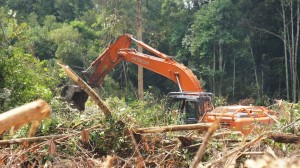 Clearance of forest for a new Bumitama palm oil plantation. Photo: The Centre for Orangutan Protection[/caption]
Clearance of forest for a new Bumitama palm oil plantation. Photo: The Centre for Orangutan Protection[/caption]
[TRIGGER WARNING] This article documents rainforest destruction and incidents of orangutan fatalities in relation to the production of Conflict Palm Oil which is regularly used by Cargill and the Snack Food 20 companies. Pictures in this article and in the full report are disturbing.
“Conflict Palm Oil” is now one of the leading causes of rainforest and peatland destruction and a leading driver of global warming. If this wasn’t bad enough, Conflict Palm Oil production is responsible for widespread human rights violations and the use of child labor and modern day slavery. But what does it look like on the ground in Indonesia and Malaysia? And who is at risk of buying Conflict Palm Oil tied to rainforest destruction and orangutan deaths?
When thinking of how to describe Conflict Palm Oil, one company comes to mind: Bumitama Agri Ltd. Bumitama is a palm oil company that owns and controls a number of subsidiaries that operate 198,000 hectares of palm oil plantations and processing plants in Borneo and Sumatra. 133,000 hectares of its concessions are already planted with palm oil, and the company is currently planting new areas at an aggressive rate of 15,000 hectares a year with a target of 200,000 hectares in plantations by 2017. In its rampant expansion, Bumitama has even endangered Indonesian national parks and forest reserves, including one concession that is impacting Tanjung Puting National Park in Borneo. Bumitama’s plans to establish palm oil plantations within the Tanjung Puting National Park and its buffer zone will further degrade the ecological integrity of this critical protected area and threaten the survival of the orangutans that live in it. 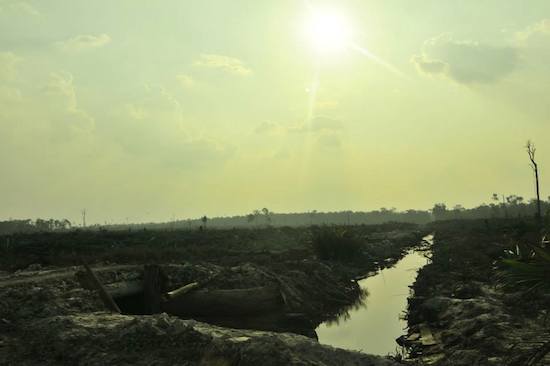
Draining of peatland, seen here on Bumitama’s concession that includes land inside and adjacent to the Tanjung Puting National Park, is a major contributor to global warming.
The Evidence
Independent field investigations have documented the destruction of forests in three of Bumitama’s subsidiaries plantations that were the home to some of the last Borneo orangutans that remain in the wild. One of the investigations was done by the orangutan rescue organization called The Centre for Orangutan Protection (COP). A young orangutan was rescued from within a Bumitama plantation in August which, sadly, died in the care of a worker. Two weeks ago today, COP were called in to rescue another juvenile orangutan from the same area that was being cleared for a new Bumitama plantation.
There are multiple instances where Bumitama have cleared critically important forests and endangered orangutan habitat. You can see more of the evidence on this bad actor’s actions in our full report.
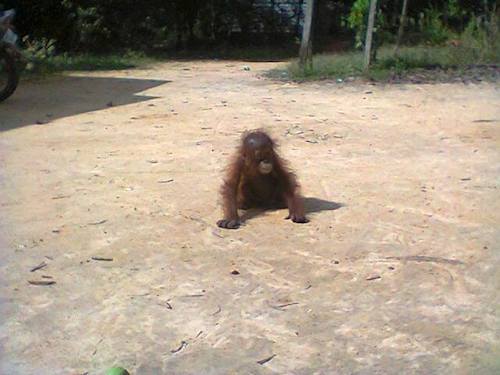
With their forests destroyed, orangutans are left to fend for themselves. Photo: The Centre for Orangutan Protection
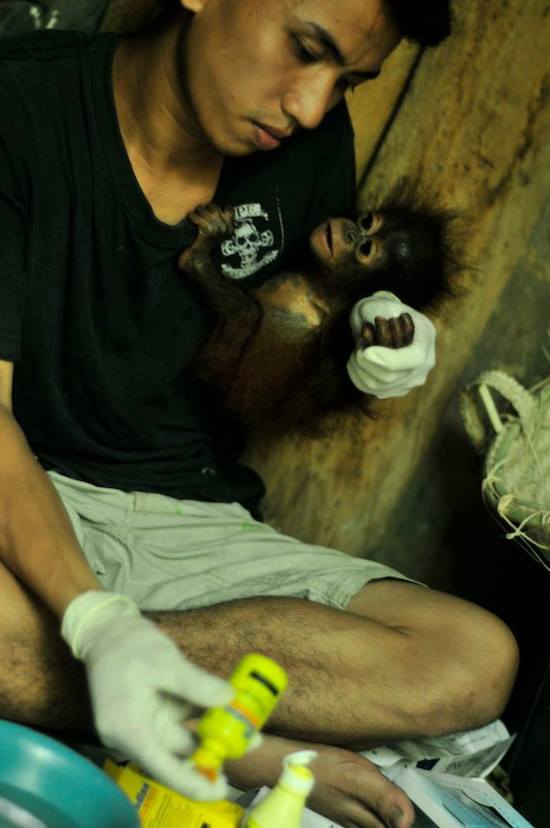
Some orangutans are rescued by the COP. Photo: The Centre for Orangutan Protection
But even rescued orangutans are harmed, like this one who has had its hands mutilated by plantation workers. Photo: The Centre for Orangutan Protection
The Snack Food 20 and Cargill
So how does Conflict Palm Oil from producers like Bumitama make its way into American snack foods? Our report shows that both the Snack Food 20 and Cargill are at risk of buying Conflict Palm Oil from Bumitama. The global agribusiness traders who purchase Conflict Palm Oil from Bumitama blend it into palm oil supply chains that feed into the global market. Cargill is a major supplier that does not require the origin of most of the palm oil it buys and trades for global markets to be known and tracked.
Simply put, Cargill has no way of knowing whether it has Conflict Palm Oil that has been produced by Bumitama in its palm oil mix. Despite years of pressuring Cargill to do the right thing, it has refused to implement safeguards that would allow it to prevent Conflict Palm Oil from contaminating its global supply chain.
Cargill’s is a major supplier of palm oil to consumer companies like the Snack Food 20. Cargill needs to put fully traceable supply chain systems in place so it knows the sources of all the palm oil it handles and profits from, and can eliminate Conflict Palm Oil palm from its supply chains. Cargill should adopt a “No Trade” list and publicly list the companies, including Bumitama, that it will not buy Conflict Palm Oil from. Until Cargill implements these safeguards on its global supply chain, Bumitama can not be ruled out as a source of Conflict Palm Oil contaminating Cargill’s palm oil supply and the products of the Snack Food 20.
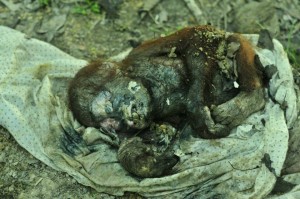 Some orangutans don’t survive after losing their forest home. Photo: The Centre for Orangutan Protection
Some orangutans don’t survive after losing their forest home. Photo: The Centre for Orangutan Protection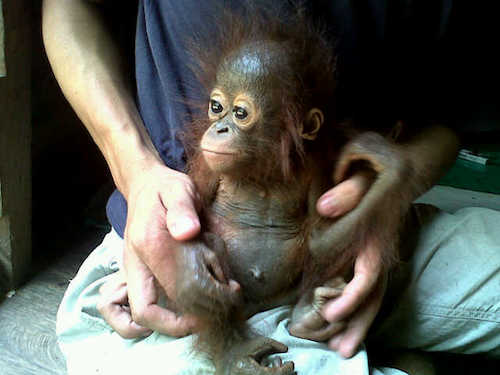
A rescued orangutan is rehabilitated by The Centre for Orangutan Protection after being found mutilated on a Bumitama plantation.
The Solution
There is a solution, and it starts with the Snack Food 20. The Snack Food 20 companies can use their purchasing power and influence to drive changes by adopting global responsible palm oil procurement policies and demanding that their suppliers, like Cargill, eliminate Conflict Palm Oil from their supply chain. (Read more about the Snack Food 20 and Conflict Palm Oil at conflictpalmoil.org.)
If the Snack Food 20 companies take these steps, and succeed in convincing traders to address the lack of transparency and traceability in palm oil supply chains, the demand for responsible palm oil will grow and provide a significant incentive for palm oil producers to fundamentally change their practices and stop destroying rainforests, worsening climate change, and violating human and labor rights.
What can traders like Cargill do?
Traders like Cargill buy massive volumes of palm oil from the companies that grow, mill, and refine palm oil. Traders are the linchpin in the international palm oil supply chain and they have uniquely influential leverage to drive a transformation in the way palm oil is produced. By failing to adopt their own global responsible palm oil procurement policy and address the lack of transparency and traceability in palm oil supply chains, traders like Cargill are placing their customers brands at risk by continuing to supply them with Conflict Palm Oil. Traders must use their influence to drive changes in the way palm oil is produced by adopting global responsible palm oil procurement policies that insist that the palm oil they buy from refineries, mills and growers is fully traceable and not associated with deforestation, expansion onto carbon-rich peatlands or human and labor rights violations.
 Volunteers on the ground are working to undo the damage Bumitama has done.
Volunteers on the ground are working to undo the damage Bumitama has done.